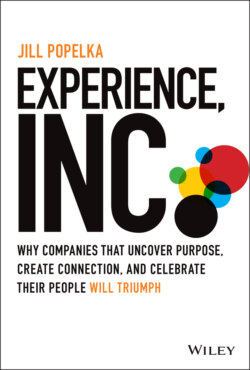Читать книгу Experience, Inc. - Jill Popelka - Страница 14
What Exactly Is “Employee Experience”?
ОглавлениеI get what she's saying. For many leaders, investing resources to plan and create an outstanding employee experience may seem difficult to justify. After all, how do you convert purpose, agency, belonging, and recognition into goals? What would you measure? How does it align with business outcomes? How would you budget for it? Who would determine if you've succeeded?
A useful definition of employee experience comes from my colleague at SAP, Dr. Steve Hunt, an industrial-organizational psychologist who has explored this topic through his work with more than a thousand companies around the globe. “‘Employee experience’ refers to the beliefs, feelings, attitudes, and behaviors resulting from one's job experiences,” says Steve. “Three basic types of experiences influence how people feel about work.”
Task experience: Is it easy to get things done? This is about providing employees with the tools and resources they need to accomplish their goals at work. Good task experiences make employees feel efficient and productive; bad task experiences create frustration and a sense that the company doesn't appreciate the employee's time or skills.
Social experience: Do I like the people I work with and how we work together? Creating effective team climates and shared norms and values that support business results. Good social experiences make employees feel welcomed, included, effective, and supported. Bad social experiences make employees feel isolated, alienated, unproductive, and annoyed.
Fulfillment experience: Does my job provide the things I want from work? Work can provide fulfillment in different ways. It may allow employees to achieve goals outside of work, such as providing for their families. It may give employees the opportunity to do work they enjoy, help them fulfill professional career goals, or enable them to achieve some higher-level purpose related to improving society or the planet.
Steve elaborates: “An employee's experience of fulfillment depends to some degree on all of these factors. But the importance of each factor varies across employees. The ideal job provides a positive task, social, and fulfillment experience. But few, if any, jobs are ideal. So employees make trade-offs between these experiences. It's easier to do a relatively unfulfilling job if we work with people we enjoy. We are willing to overcome bad task experiences if we believe in the purpose of our work. On the other hand, if any one of these experiences falls below a certain level for an extended amount of time, then jobs become unpleasant, stressful, and often intolerable.”
Employee experience impacts purpose, agency, belonging, and recognition. A bad task experience hurts your agency – it undermines your ability to do what you need to do to be successful. A bad social experience often makes you feel uncared for and unwanted. And an unfulfilling job, by definition, is one that does not give you a sense that your work is meaningful and purposeful. You can feel unappreciated in all three types of experience: The company doesn't appreciate the value of your time (task), doesn't appreciate who you are as a person (social), or doesn't appreciate what you want to achieve in your career (fulfillment).
Here's another analogy I like to use, about one of my favorite experiences: hiking. Task experience is like having boots that fit. A hike will not be good simply because your boots fit. But if your boots don't fit, then the hike will be frustrating and potentially miserable.
Social experience is about whom you're hiking with. Do you all get along, enjoy each other's conversation, and walk at the same general pace?
Fulfillment experience is about where you're hiking to. Are you hiking through a beautiful valley to a lake you've always wanted to see, walking around a suburban neighborhood, or trudging through a mosquito-infested swamp?
Whether the hike is good or bad depends on all three of these elements. But if any single one falls below a certain level, the hike will be terrible.
For a business, the results that derive from positive employee experiences are not always direct but they are profound and provable. A nurturing and purposeful environment alters employee beliefs and attitudes. This translates to changes in employee behavior. And that benefits the bottom line. When the company creates a positive “organizational climate” – a concept from psychology, describing an environment that reflects beliefs, attitudes, and behavioral norms shared across people in a group – it influences sales revenue, customer satisfaction scores, manufacturing productivity, product quality, patient care, safety incidents, security breaches, employee well-being, equity and inclusiveness, and other metrics that impact company profit and growth. Furthermore, when you create such an appealing organizational climate, talented people who are outside the tent want to come join you inside it.
A company that does not put its employees first, whose workers are figuratively hiking through a swamp in ill-fitting boots, with people whose presence they don't enjoy: That's a business with serious problems.
